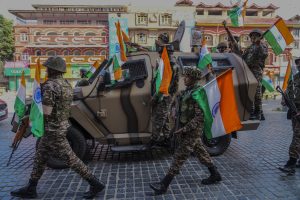As Kashmir gears up for its first local assembly election in a decade, there is a battle underway. It’s not just a contest for the hot-seat of power but a duel of competing narratives, each underlying how a Muslim-majority region should adapt to the ignition of Hindu nationalist rage seen in the Narendra Modi years.
Should the people of Kashmir surrender to Modi’s unrelenting commitment to pursuing majoritarian agendas and accept his animated audience’s arbitrary dictations regarding Kashmir’s political and social disposition, to secure tolerance for their existence? Or should they resist it? What would be the fallout of resistance at a time when there is a proclivity to view any articulation against the Hindu hegemonic order as a globally coordinated campaign to weaken India’s territorial integrity?
The electorate of Jammu and Kashmir (J&K) – around 8.8 million people – will vote in three phases on September 18, September 23 and October 1. The counting will be held on October 4.
As polling inches nearer, the Modi regime can be seen making more powerful expositions of its pledge to run a reforming government in the region. Lieutenant Governor Manoj Sinha gave carefully crafted interviews timed around the fifth anniversary of the abrogation of Kashmir’s special status on August 5. They cataloged his administration’s determination to uplift Kashmir’s ramshackle economy. “About 42,000 government jobs have been filled… We have received investment proposals to the tune of Rs. 1,25,000 crore [1.25 trillion rupees, or $14.9 billion],” boasted Sinha.
Sinha’s stress on the economy is deliberate. By framing the genesis of a vexing political conflict as a mere corollary to economic instability and arguing that Kashmir’s special status scuppered economic development, the right-wing Bharatiya Janata Party (BJP) aims to legitimize its monopolization of power in J&K and deflect focus from the organized disempowerment of Kashmiris, which has intensified in the past five years.
But the National Conference (NC) and the Peoples Democratic Party (PDP), the two principal political entities in J&K, aver that the solution to anti-India alienation in Kashmir lies not in the exercise of coercion to suppress people’s political aspirations, but has to come through dialogue with stakeholders. Their immediate task is to preclude the BJP and its political proxies at the upcoming election.

































